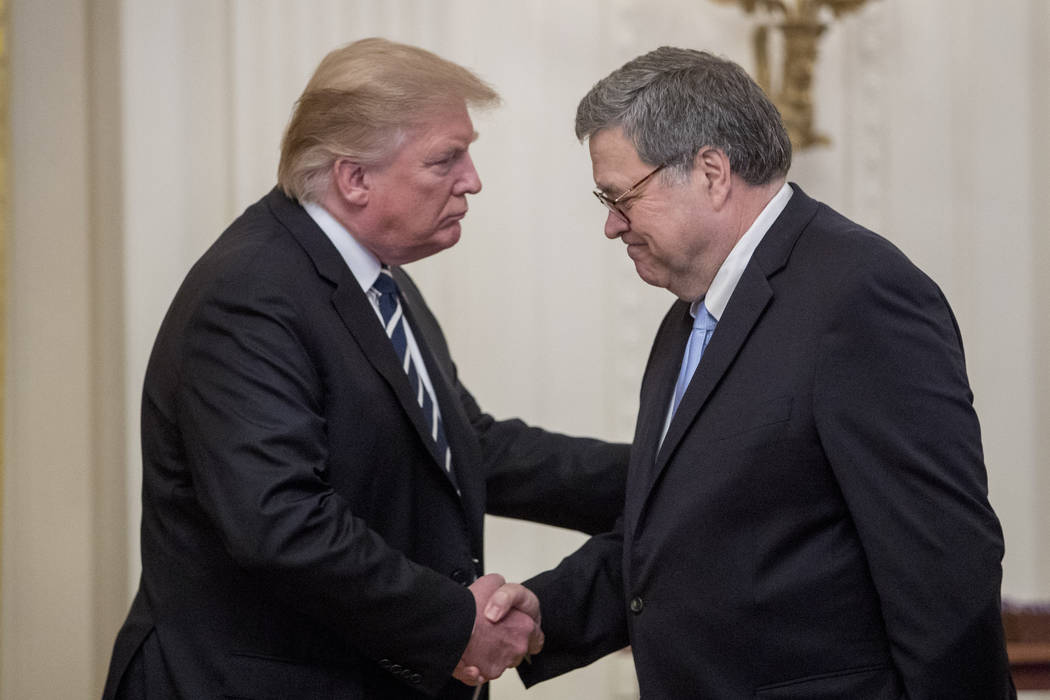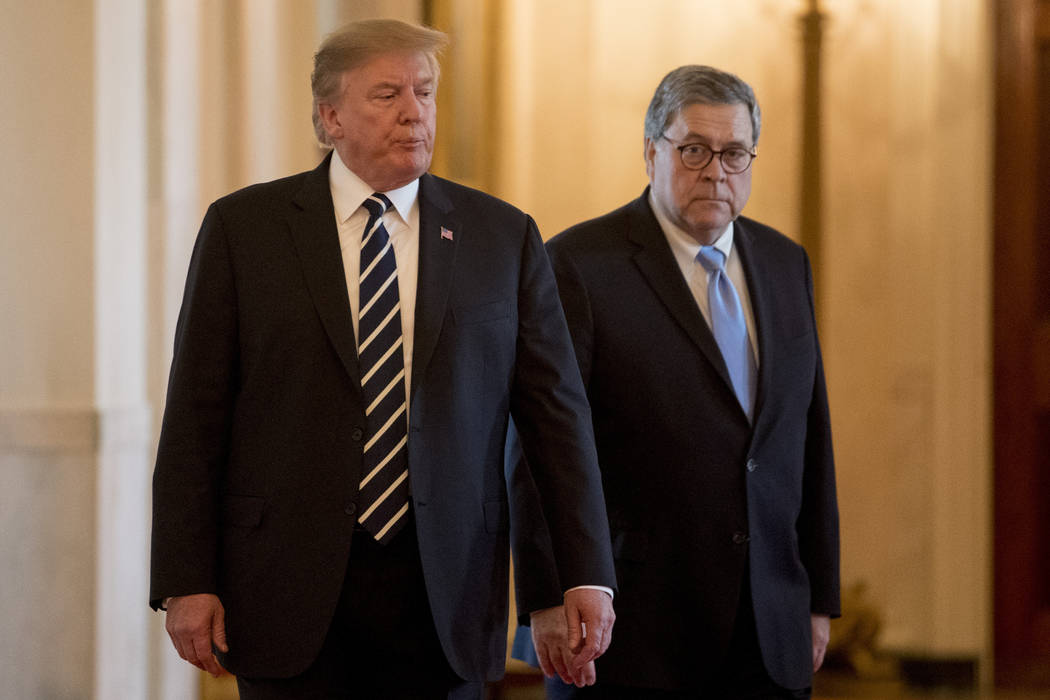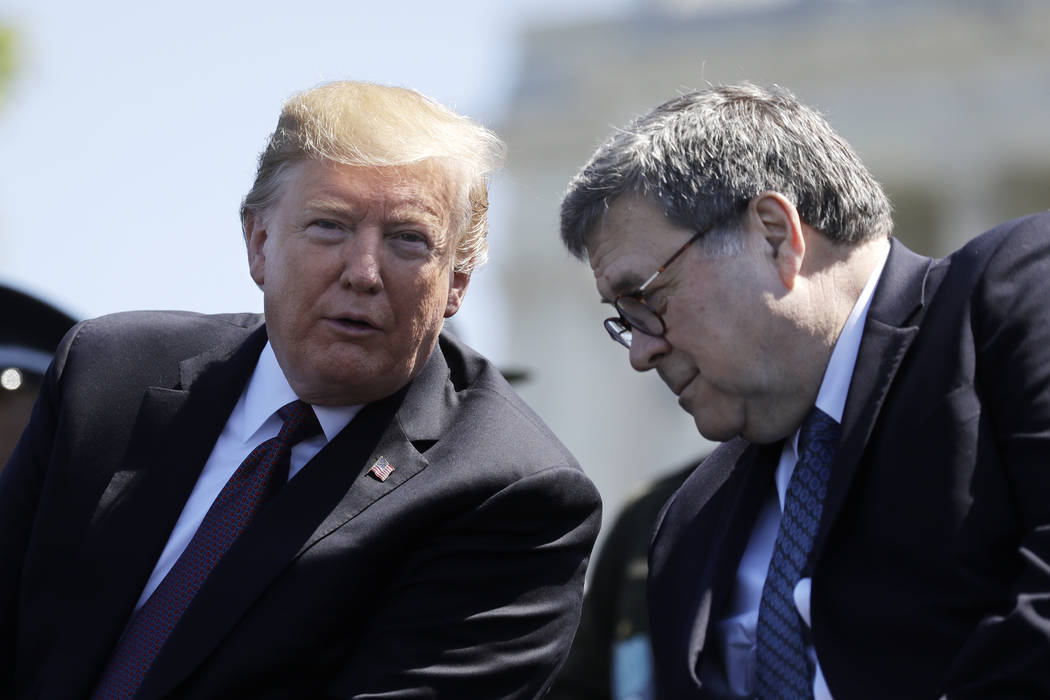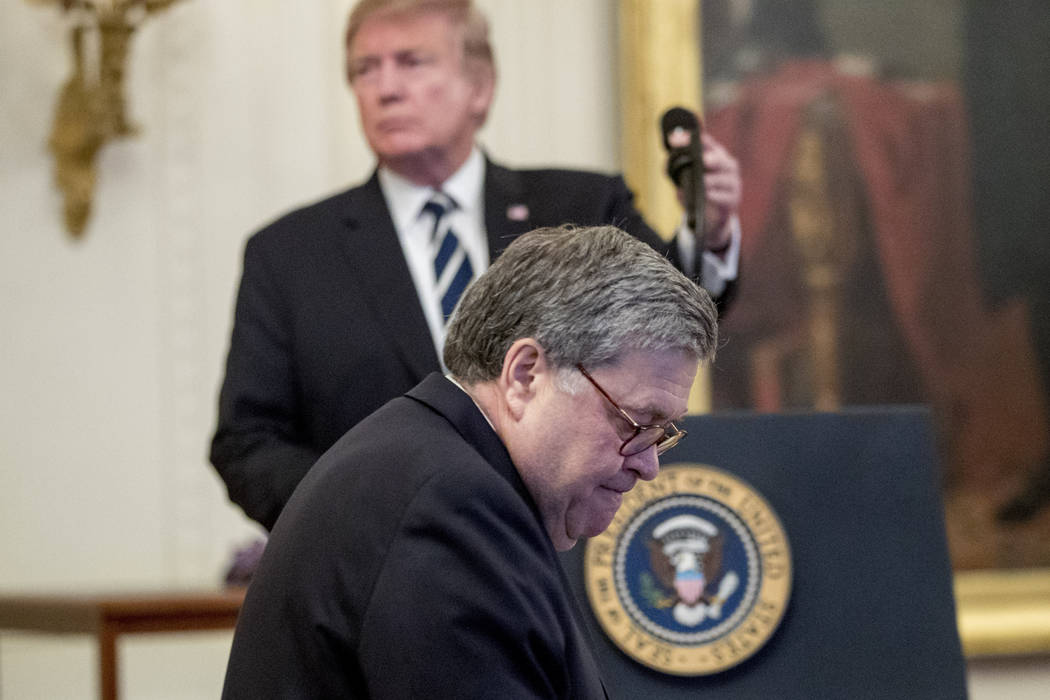Trump plans to declassify Russia intel documents
WASHINGTON — President Donald Trump says he will declassify documents related to the origins of the investigation into Russia’s links to the campaign.
Trump, leaving the White House on Friday for Japan, told reporters that the investigation was “an attempted coup.”
The president said it could run up to “millions of pages” and said he wanted to declassify FBI and CIA documents, including those that might pertain to contacts overseas in the United Kingdom.
Trump’s comments come a day after he granted Attorney General William Barr new powers to review and potentially release classified information.
The president ordered the U.S. intelligence community to “quickly and fully cooperate” with Barr’s investigation into the origins of the Russia probe.
Trump said Barr is “in charge” and “let’s see what he finds.”
The move marked another effort in Trump’s efforts to undermine the findings of special counsel Robert Mueller’s probe amid mounting Democratic calls to bring impeachment proceedings against Trump.
Press secretary Sarah Sanders said in a statement that Trump is delegating to Barr the “full and complete authority” to declassify documents relating to the probe, which would ease his efforts to review the sensitive intelligence underpinnings of the investigation. Such a move could create fresh tensions within the FBI and other intelligence agencies, which have historically resisted such demands.
Declassification power granted
Trump is giving Barr a new tool in his investigation, empowering him to unilaterally unseal documents that the Justice Department has historically regarded as among its most highly secret. Warrants obtained from the Foreign Intelligence Surveillance Court, for instance, are not made public — not even to the person on whom the surveillance was authorized.
Trump explicitly granted Barr declassification power — noting it would not automatically extend to another attorney general — and only for use in the review of the Russia investigation. Before using the new authority, Barr should consult with intelligence officials “to the extent he deems it practicable,” Trump wrote in a memo formalizing the matter.
I don’t know why the Radical Left Democrats want Bob Mueller to testify when he just issued a 40 Million Dollar Report that states, loud & clear & for all to hear, No Collusion and No Obstruction (how do you Obstruct a NO crime?) Dems are just looking for trouble and a Do-Over!
— Donald J. Trump (@realDonaldTrump) May 24, 2019
The president has frequently claimed his campaign was the victim of “spying,” though the intelligence community has insisted it acted lawfully in following leads in the Russia investigation and conducted surveillance under court order.
Barr has already asked John Durham, the U.S. attorney in Connecticut, to examine the origins of the Russia investigation to determine whether intelligence and surveillance methods used during the probe were lawful and appropriate. Still, Barr has been directly involved, according to a person familiar with the matter who was not authorized to discuss it publicly, and is working with CIA Director Gina Haspel, Director of National Intelligence Dan Coats and FBI Director Christopher Wray.
FBI may oppose
Wray vocally opposed the release by Congress last year of details from a secret surveillance warrant obtained by the bureau on a former campaign adviser, Carter Page. The White House had eagerly encouraged Republicans on the House intelligence committee to disclose that classified information, believing it could help undermine the Russia investigation.
Wray, though cooperating with Barr in a review of the origins of the Russia probe, would presumably balk at declassifying classified information that could reveal sensitive sources or methods of investigators.
Trump move criticized
Former intelligence officials and Democratic leaders on congressional intelligence committees criticized Trump’s decision.
David Kris, former head of the Justice Department’s national security division, said it’s “very unusual — unprecedented in my experience — for a non-intelligence officer to be given absolute declassification authority over the intelligence.”
John McLaughlin, former deputy director of the CIA who served as acting director in 2004, tweeted: “Giving Barr declassification authority for this investigation is a really bad idea. The agencies can cooperate but must retain their legal responsibility for protecting sources. Congressional intelligence committees need to stand in the door on this one.”
Virginia Sen. Mark Warner, the ranking Democrat on the Senate intelligence committee, said lawmakers still don’t have the full Mueller report.
We still don’t have the full Mueller report, so of course the President gives sweeping declassification powers to an Attorney General who has already shown that he has no problem selectively releasing information in order to mislead the American people.
— Mark Warner (@MarkWarner) May 24, 2019
“So of course the president gives sweeping declassification powers to an attorney general who has already shown that he has no problem selectively releasing information in order to mislead the American people,” Warner tweeted Friday.
‘Un-American’
California Rep. Adam Schiff, chairman of the House intelligence committee, called Trump’s decision “un-American.”
“While Trump stonewalls the public from learning the truth about his obstruction of justice, Trump and Barr conspire to weaponize law enforcement and classified information against their political enemies. The cover-up has entered a new and dangerous phase,” Schiff tweeted.
Despite Mueller finding no evidence to support criminal charges against Americans related to Russia’s actions, his report documented extensive Russian efforts to interfere in the 2016 campaign and willingness on the part of some in Trump’s orbit to accept that aid.
Barr’s status solidified
Thursday’s move further solidifies Barr’s position in Trump’s eyes as a legal warrior on fighting on his behalf.
After Mueller submitted his report to Barr in March, the attorney general released a four-page summary to Congress. Barr’s letter framed the debate about the probe over the next few weeks and, White House officials believe, allowed Trump to declare victory before the release of the full report, the contents of which are far more ambiguous.
Trump also appreciated Barr’s combative stance with lawmakers and reporters as he defended the Justice Department’s handling of the report, and again when he declined to appear before Congress and defied a subpoena, drawing a possible contempt charge. Trump has told close confidants that he “finally” had “my attorney general,” according to two Republicans close to the White House who were not authorized to speak publicly about private conversations.
“Today’s action will help ensure that all Americans learn the truth about the events that occurred, and the actions that were taken, during the last presidential election and will restore confidence in our public institutions,” Sanders said.
Two of Trump’s congressional allies, Reps. Mark Meadows and Jim Jordan, were seen by reporters earlier Thursday at the Justice Department.
———
Associated Press writers Mike Balsamo, Eric Tucker, Jonathan Lemire and Deb Riechmann contributed to this report.





















